This article is a good opportunity to learn about the most beautiful churches in Florence which are important works of Renaissance and Gothic architecture and hide beautiful art masterpieces. Like many Italian cities, Florence is filled with churches. Therefore, in order to see many of these masterpieces, it is necessary to visit at least a few churches. Any seasoned traveler, whether religious or not, knows that churches around the world often present some of the most spectacular art and architecture a city has to offer. In Florence, the very cradle of the Renaissance, it’s no surprise that these holy institutions have so much to offer!
As you wander through the city, stopping into any chapel you cross, you’re bound to be astonished! But for those looking for a more direct itinerary, we present the most amazing cathedrals of Florence.
List of Famous Churches in Florence
1. Basilica of Santa Spirito
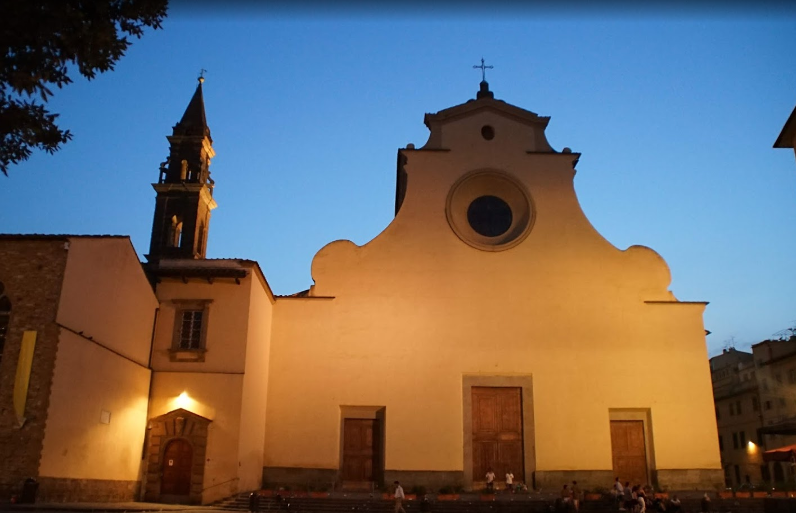
Basilica of Santa Spirito
The Basilica of Santo Spirito is also an example of Renaissance architecture, though unlike Santa Maria Novella or Santa Croce, the façade of Santo Spirito was left bare, without decoration of marble and sculpture. Today this ancient church in Florence is painted completely white and it has a modest, almost angelic quality to its plain exterior. The interior houses a number of frescoes in its many side-chapels as well as Michelangelo’s wooden crucifix. When Michelangelo was 17, he was given permission to make studies of the bodies coming from the hospital, even though this practice was illegal, and so he based this tiny wooden figurine of Christ on his anatomical, true-to-life drawings.
Address: Basilica of Santa Spirito, Florence, Italy.
2. Giotto’s Campanile
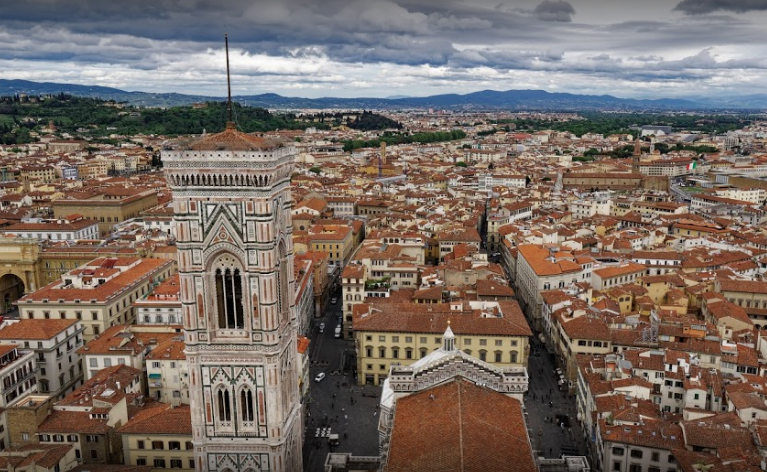
Giotto’s Campanile
If you’re an architecture enthusiast and are looking for a great example of the Florentine Gothic architectural style, then you have to see the Campanile di Giotto. It features marble in the hues of green, pink, and white. You also have to climb to the top of the structure to see marvelous vistas over Florence. This important historical church in Florence was made between 1334 and 1359 and was a collective work of three artists; Giotto started it, followed by Pisano, and finished by Talenti.
Address: Piazza del Duomo, 50122 Firenze FI, Italy
Read More: Best Things to Buy in Florence
3. Pazzi Chapel
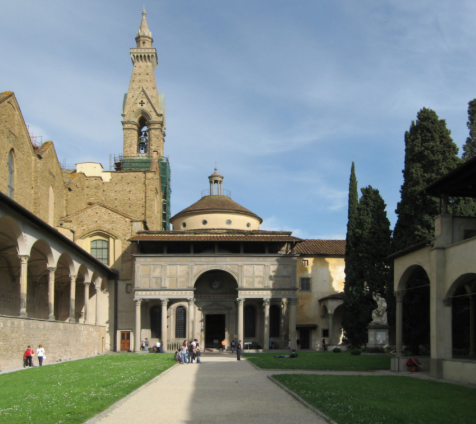
Pazzi Chapel
Considered as a significant example and a masterpiece of Renaissance architecture, the Pazzi Chapel, which is in the Basilica di Santa Croce in Florence, serves as the Cathedral Chapter House and a classroom dedicated to religious teachings. The iconic cathedral in Florence was built between 1442 and 1443 and has renaissance influence, which you can see in its beautiful dome and its little details. Many artists contributed to this splendid chapel making it an extraordinary example of the Early Renaissance style. While the chapel’s interior has a distinctive Brunelleschian look (you’ll see many similarities if you visit the Old Sacristy in San Lorenzo Church in Florence, which was designed by the same architect), the portico has been attributed by critics to Giuliano da Maiano, Rossellino or Michelozzo.
Address: 50122 Florence, Metropolitan City of Florence, Italy
4. Basilica of San Lorenzo
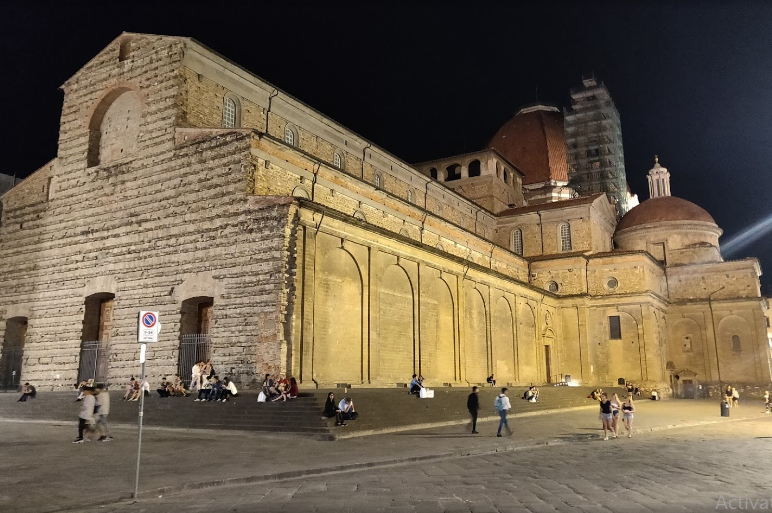
Basilica of San Lorenzo
Untouched and preserved, the façade of the Basilica of San Lorenzo makes it the oldest structure in Florence. This important church in Florence is the parish church of the Medici, a wealthy family in Florence during the 1400s. One of its notable features is its symmetry and harmony which is an impressive example of the Renaissance architectural style. Apart from the Renaissance style, Michelangelo’s new sacristy, which is a part of the basilica, used an almost Mannerist style of architecture that was a notable style in the 1520s.
Address: Piazza di San Lorenzo, Florence, Italy
5. Piazza Santo Spirito
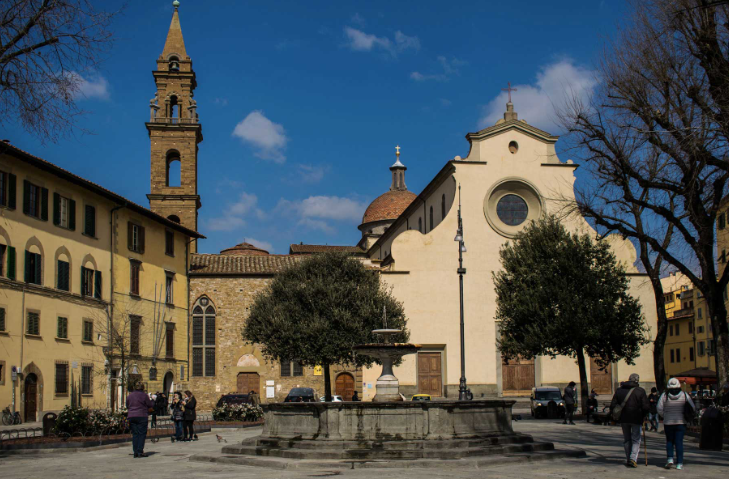
Piazza Santo Spirito
We would say less about these smaller churches, but hope that you’ll find the time to follow my “church in Florence” tour, as these spaces are truly special, and each one is distinct! Lots of people visit Piazza Santo Spirito, in the Oltrarno, in the evening for the area’s great nightlife, but at that time, this most famous church in Florence by Brunelleschi is closed. Head over during the day and you’ll be greeted with silence off the buzzing piazza as soon as you go inside its double doors. This church was designed by Brunelleschi almost 20 years after San Lorenzo, though it was finished after his death, and plans were changed at that time. It makes for an interesting comparison if you’ve visited both of them! Here at Santo Spirito, it’s nice to stop and look at the excellent quality paintings found on the side altars. Don’t miss the crucifix said to be by Michelangelo in the sacristy.
Address: Piazza Santo Spirito, 50125 Firenze FI, Italy.
6. Santa Trinita
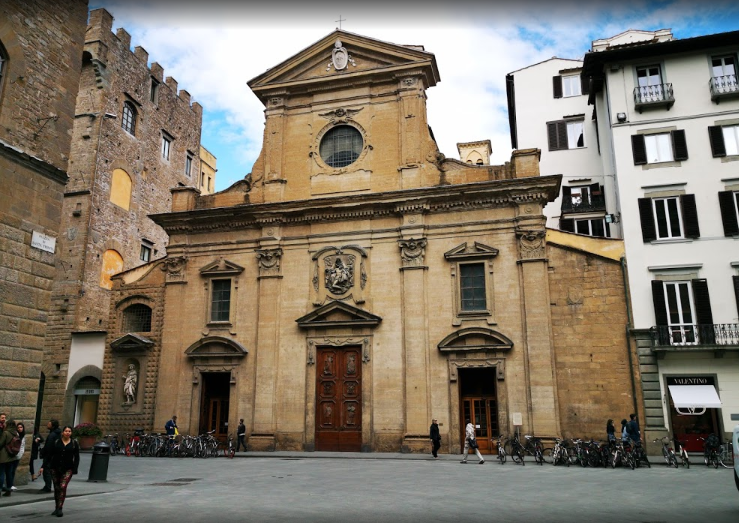
Santa Trinita
At the end of Florence’s swank shopping street via Tornabuoni, just before you hit the Arno and go over the ponte di Santa Trinita is a piazza and church of the same name. This most popular church in Florence is never crowded with tourists because it’s not considered a major site to see, yet it houses a very interesting fresco by Domenico Ghirlandaio from the 1480s. The Sassetti Chapel is located to the right of the high altar and it tells stories of Saint Francis. What’s fun about these scenes is that they are set in contemporary Florence rather than in the saint’s lifetime. Ghirlandaio was much loved as an artist for his ability to render the opulence of peoples’ clothing and details of their faces and hair in paint, and these frescoes contain portraits not only of the city but of the nobles who inhabited it.
Address: Piazza di Santa Trinita, 50123 Firenze FI, Italy.
Also Read: Best Foods in Florence
7. Santa Felicita
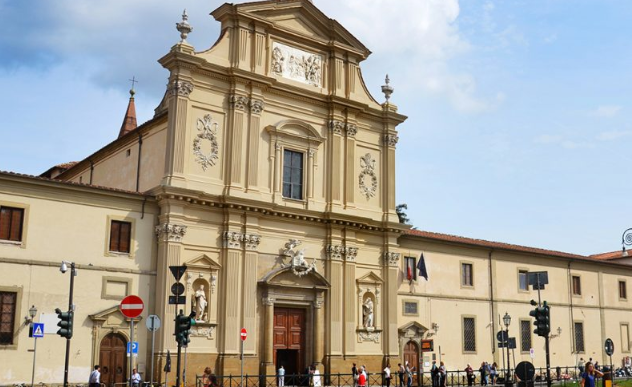
Santa Felicita
With the glitter of gold from the Ponte Vecchio still in your eyes, stop into the little church of Santa Felicita tucked off to the left on the street that runs from the old bridge to Palazzo Pitti. While as a whole it might not seem particularly special, there is one chapel, to the right of the entrance, that will knock your socks off! This is the Capponi chapel, with paintings by Mannerist artist Pontormo. The brightly coloured Deposition, on the altar, is only part of the story, which continues on the entrance wall with a fresco of the Annunciation and in the roundels above with portraits of the four evangelists by Pontormo and Bronzino. The earlier Renaissance looks like an old maiden in comparison to these exuberant forms and colours, recently brought back to light through restoration (read about it here). The young and energetic Pontormo’s style broke with tradition and introduced compositions that nobody had ever seen before.
Address: Santa Felicita, Florence, Italy
8. Basilica of Santa Croce
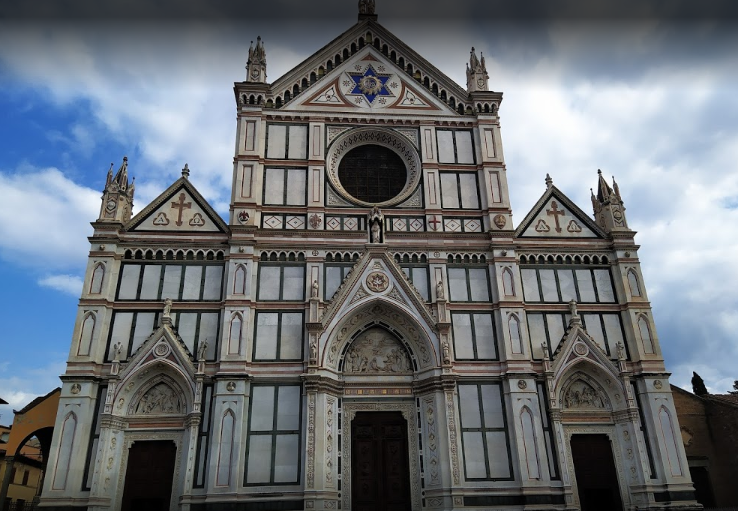
Church of Santa Croce
The basilica of Santa Croce is the largest Franciscan church in the world, and it houses an impressive 16 different chapels. For a while, this religious building in Florence was the rival Church of the Dominican Santa Maria Novella, and it was very popular amongst the poorer peasants of Florence during the late middle ages. Many of the most influential and culturally important Florentines and Italians have memorial monuments in the Santa Croce Basilica including Dante, Galileo Galilei, Machiavelli, and Michelangelo. The façade of the Church was greatly damaged during the devastating 1966 flood, but it has since been restored and its inlaid marble façade from the 19th century is still quite remarkable.
Address: Basilica of Santa Croce, Florence, Italy.
9. Piazza del Duomo (Florence Cathedral)
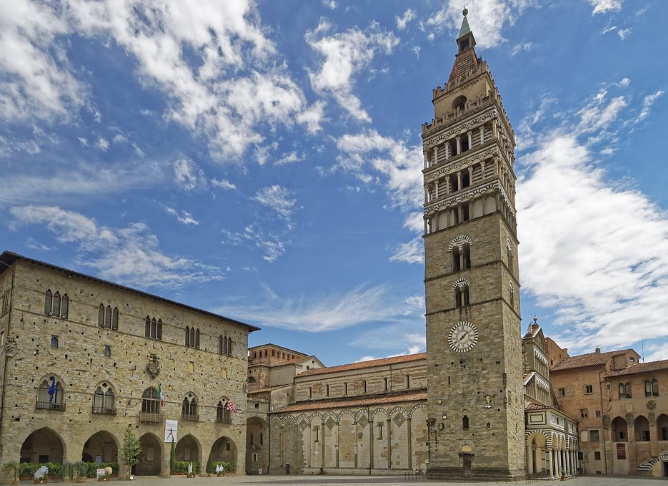
Piazza del Duomo
Florence’s Piazza del Duomo is located in the heart of the city, where in just one glimpse you can instantly admire the main monuments of the historic centre, also listed as a UNESCO World Heritage Site. Overlooking the square is the Basilica of Santa Maria del Fiore, originally begun by Arnolfo di Cambio in 1296, and crowned in 1436 by Filippo Brunelleschi’s masterpiece: the Dome. This third biggest cathedral in Florence as well as in the world is a symbol of Florence is an arduous and majestic structure, from where you can enjoy a fantastic panorama of the city and the cathedral’s interior.
Another giant stands out alongside the façade, Giotto’s Bell Tower, soaring in its chromatism, while the ancient Baptistery of San Giovanni Battista is located opposite the cathedral, a Romanesque jewel adorned with bronze doors by Ghiberti and Andrea Pisano.
Address: Piazza del Duomo, Florence, Italy.
10. San Miniato al Monte
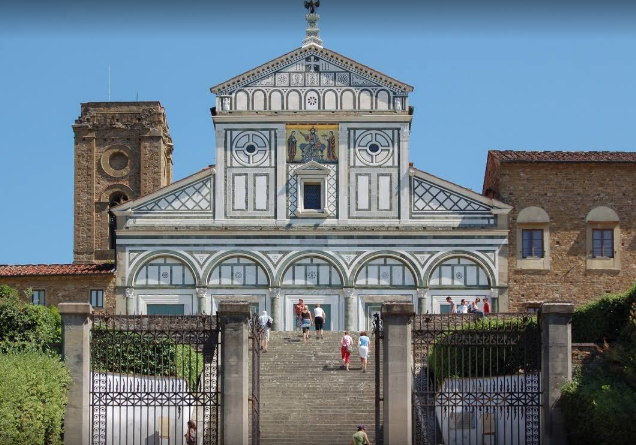
San Miniato al Monte
San Miniato al Monte tops a hill beyond Florence’s Arno River, just beyond Piazzale Michelangelo. The destination is worth a brief climb, or an even easier bus trip, to reach its green and white marble façade, the first of its kind, which faces a spectacular Florentine skyline panorama.
The interior is eclectic in style, with Byzantine mosaics, Renaissance chapels, a Romanesque pulpit and choir screen, recycled Roman columns, and impressive frescoes by Taddeo Gaddi and Spinello Aretino. This most beautiful church in Florence is surrounded by a serene cemetery, home to the tomb of Pinocchio’s author, Carlo Collodi. Olivetan monks work on the property, hand crafting honey, herbal teas, and liqueurs, which can be purchased in the gift shop.
Address: Via Delle Porte Sante, 34, 50125 Firenze FI, Italy
Check: Famous Street Food in Tuscany
11. Santa Maria Novella
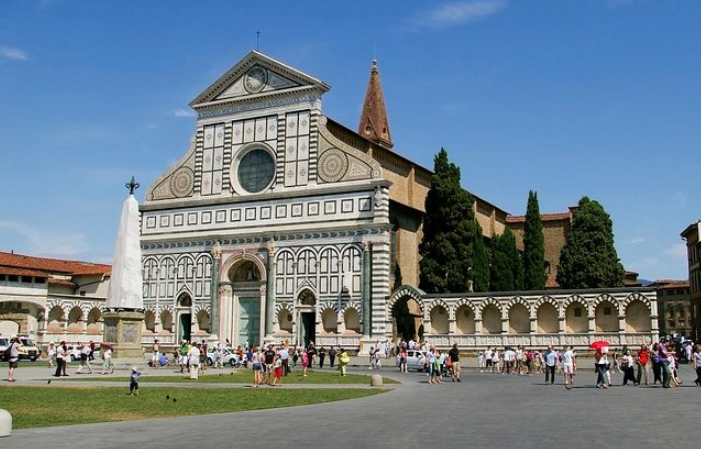
Santa Maria Novella
This under-rated gem is located just steps from the city’s central train station of the same name. The monastic complex boasts the oldest extant church façade in Florence. Though the exterior of the church is distinctively 14th-century Gothic style, the interior displays a variety of Gothic, Romanesque, Renaissance, and Classical elements. This peaceful sanctuary tends to make a great escape from the bustling tourist crowds, who often overlook it in search of more famous churches. While you’re here, take a moment to explore the cloisters and chapels of the former convent.
One of the oldest churches of the Dominican Order in Florence is the Basilica of Santa Maria Novela that dates back to the middle ages. This building was created using a mixture of architectural styles. The construction of this popular building in Florence started with a Gothic style, and after 200 years, the façade was finished using the Renaissance architectural style, which you can see in its Romanesque columns, arches, and pediments. Another notable thing about the structure is it is home to the Holy Trinity, which is a masterpiece of Masaccio.
Address: Piazza Santa Maria Novella, 18, Florence, Italy.
12. Church of Santa Croce
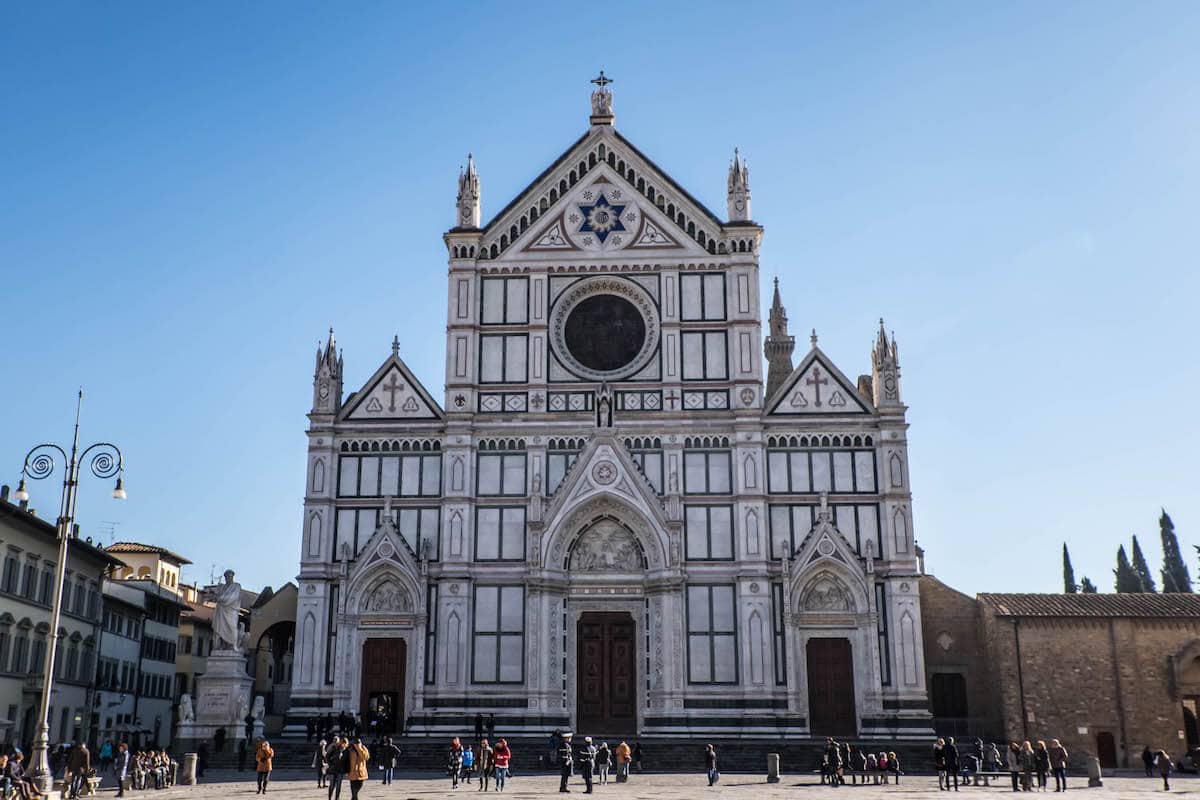
church of santa croce
While Santa Croce is certainly not the most beautiful church of Florence, it is nonetheless one of the most important. Completed in the early 15th century, with a lovely 19th century coloured marble façade, this Gothic cathedral is known for housing the tombs of famous Italian artists, writers, musicians, and scientists, including Machiavelli, Galileo, Gioacchino Rossini, and Michelangelo. Michelangelo’s tomb is watched over by 3 muses of Painting, Architecture, and Sculpture, which were sculpted specifically for the tomb by Michelangelo’s friend and colleague, Giorgio Vasari.
This most visited church in Florence is also home to Donatello’s “Annunciation” relief, created in 1435. On the right side of the church, one can find Brunelleschi’s “Cappella dei Pazzi”, which he worked on from 1430 until his death in 1446, and the “Great Cloister” of the same genius.
Address: Piazza Santa Croce, 16, Florence, Italy.
13. San Miniato al Monte
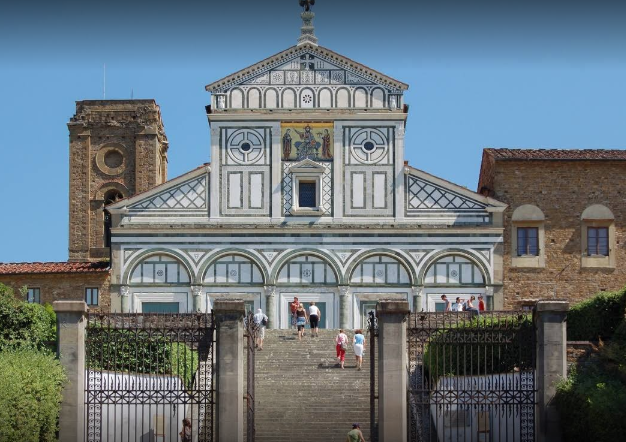
San Miniato al Monte
If you are looking for the most breathtaking panoramic view of Florence, you need to visit San Miniato al Monte whose name befits its location (al monte= on the mountain). Although it is a bit outside of the city, you can walk, take public transportation or drive to this stunning church.
Built between the 11th and 13th centuries, this beautiful cathedral in Florence is a gorgeous representation of the Romanesque style and design. While the geometric marble façade looks similar to some of the other churches in Florence, the inside boasts a unique crypt, sanctuary, and an impressive chorus platform and pulpit. Be sure to check the monumental cemetery out back where Carlo Collodi, author of Pinocchio, sculptor Libero Andreotti, and politician Giovanni Spadolini are buried.
Address: Via Delle Porte Sante, 34, 50125 Firenze FI, Italy.
Also Read: Beautiful Beaches Near Florence
14. San Marco
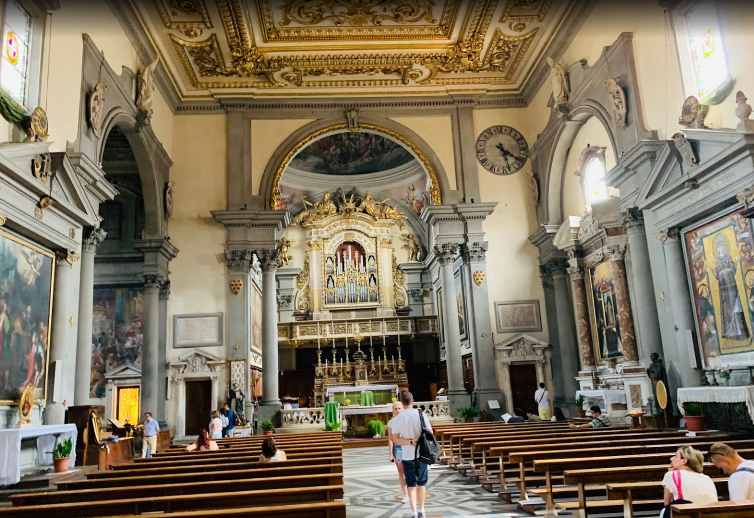
San Marco
The church of San Marco was largely reconstructed in 1299 and the monastery completely rebuilt by the architect Michelozzo in the mid-15th century. Giambologna added the side altars, the Chapel of St. Antonino, and the Salviati Chapel in 1588. Although you’ll find some notable art in the church itself — the funerary chapel of St. Antony is considered Giambologna’s main architectural work, and the Byzantine mosaic Virgin in Prayer from a Rome oratory dates to 705 — the convent is why you should visit San Marco.
This cathedral in Florence owes its fame to the Dominican monk Fra Angelico, who painted the monastery rooms between 1436 and 1445, leaving us a “natural” museum. Throughout the monastery are works of this brother, along with a few others, but look especially for these frescoes. Just opposite the entrance to the Cloister of St. Antonino is Fra Angelico’s fresco St. Dominic at the Foot of the Cross; in the lunette diagonally opposite the entrance is Ecce Homo. In the Great Refectory is Fra Bartolomeo’s Last Judgment, and in the Sala dei Lavabo is his large 1510 panel Madonna with St. Anne and other Saints. One entire wall of the chapter house is filled by Fra Angelico’s fresco The Crucifixion. In the Small Refectory is a famous Last Supper by Ghirlandaio. But what you will remember the most are the more than 40 monks’ cells adorned with frescoes by Fra Angelico and his students. His style is unmistakable, tenderly transforming the austere rigidity of the medieval saints into gentle, human saints that radiate piety and innocence. Look especially for the highly intimate Annunciation opposite the stairs.
Address: Piazza San Marco 3, Florence, Italy.
15. Cappella Brancacci and Santa Maria de Carmen
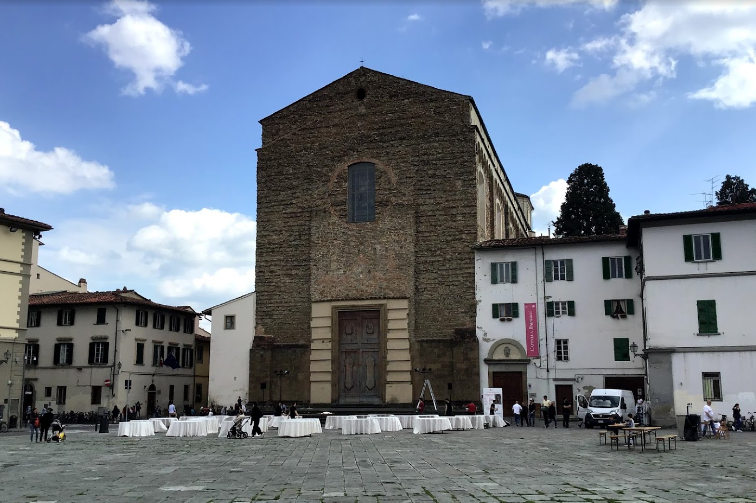
The plain unfinished façade of Santa Maria de Carmen gives no clue to the treasures inside. Neither, in fact, does the first view of its Baroque interior, with its carvings and Trompe-l’oeil ceiling. These are the result of rebuilding, after a fire in 1771 destroyed the interior. Fortunately, this famous cathedral in Florence did not destroy the exquisite attached chapel, the Cappella Brancacci, whose interior is decorated by 15th-century frescoes illustrating the life of St. Peter and other Biblical scenes.
Designed and begun by Masolino da Panicale with his pupil Masaccio, they were completed after Masaccio’s death by Filippino Lippi. The recent removal of layers of candle soot has revealed intense colors and made the differences in the work of the different artists more apparent. Masaccio’s realism and use of perspective inspired the 15th-century Florentine painters.
Address: Piazza del Carmine 14, Florence, Italy.
16. Santo Spirito

Santo Spirito
Several wealthy Florentine families commissioned Brunelleschi, the city’s famous architect, to design and build a new church in the Oltrarno, and by the time of his death in 1446, the building had progressed as far as the vaulting. This ancient cathedral in Florence was completed, but not entirely to his original plans, so the austere exterior gives no hint that inside is one of the purest Renaissance churches. But the transept chapels hold some of the greatest treasures. The right arm of the transept holds the most important work in the church, the 1490 altarpiece Madonna and Child with Saints and Donors by Filippino Lippi.
Address: Piazza Santo Spirito 30, Florence
17. Santissima Annunziata (Church of the Annunciation)
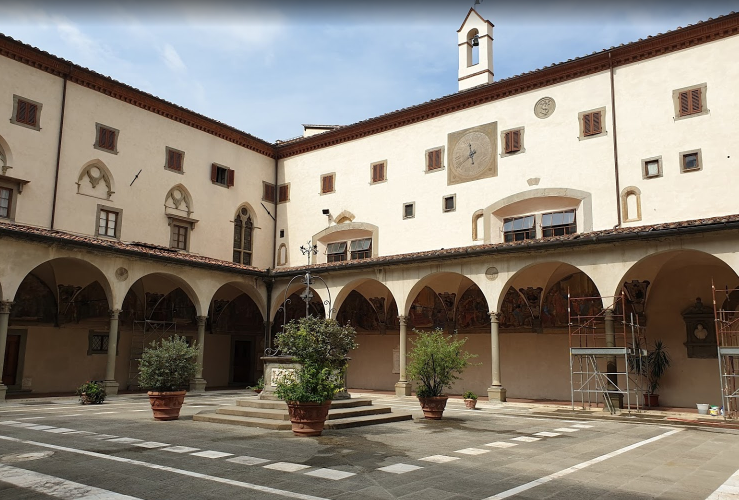
Santissima Annunziata
Completely rebuilt between 1444 and 1481 by Michelozzo, this old church in Florence is considered his architectural masterpiece and contains some superb works of art, although some of the artists may not be universally familiar names. The rotunda, divided into nine chapels, was begun by Michelangelo in 1444 and completed in a different style by Leon Battista Alberti. Close to the entrance, on the left, the small marble temple by Michelozzo was commissioned for the miraculous picture of the Annunciation (the miracle involves the13th-century monk Friar Bartolomeo, who fell asleep while painting it and awoke to find that angels had completed the face of Mary). The miracle drew pilgrims who left so many votive offerings that the church had to be enlarged to accommodate them.
Address: Piazza SS Annunziata, Florence, Italy.
18. Ognissanti (All Saints’ Church)
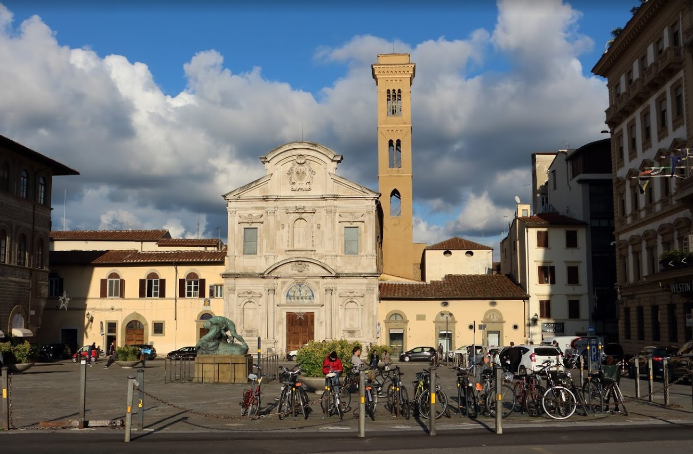
Ognissanti
The church of Ognissanti, one of the first Baroque churches in Florence, dates back to a 13th-century building but was completely renovated in the 16th and 17th centuries and restored after damage by the flood of 1966. At the second altar on the right, in Domenico Ghirlandaio’s Madonna della Misericordia (1470), look for the young Amerigo Vespucci, the navigator for whom two continents are named. This was his family’s parish church, and Ghirlandaio included him among the parishioners pictured, long before his illustrious career began. The sacristy contains a painting on wood, Christ Crucified, in the style of Giotto and a fresco of the Crucifixion by Taddeo Gaddi. Enter the cloister through the transept to see 17th-century frescoes with scenes from the life of St. Francis. Beyond is the Cenacolo del Ghirlandaio, the refectory with its fresco of the Last Supper by Ghirlandaio, which takes up the whole of the rear wall. Also here is Ghirlandaio’s St. Jerome in his Chamber (1480) and Sandro Botticelli’s famous Saint Augustine at Study.
Address: Piazza Ognissanti 42, Florence, Italy
Don’t Miss: Best Water Park, Amusement Park in Florence
19. San Michele in Orto (Orsanmichele)
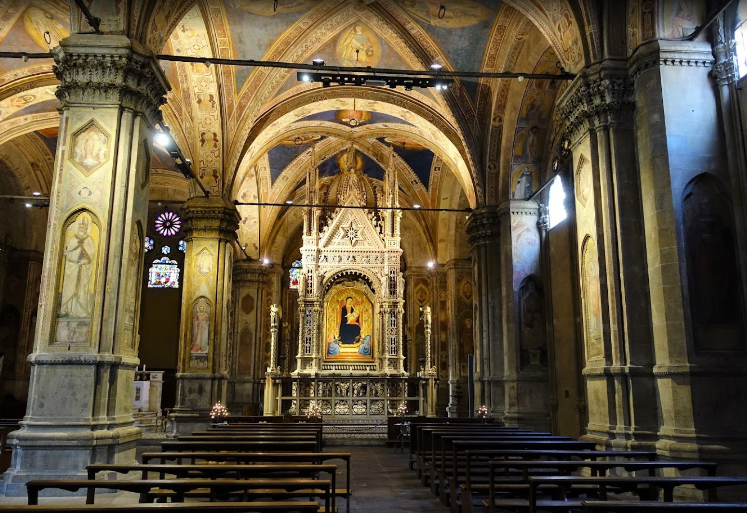
San Michele in Orto
This well-preserved 14th-century building developed from oratory and a grain trading hall, which held a miraculous picture that attracted more worshippers than buyers. So in the late 14th century, the building’s religious significance predominated and it became a church, also known as Orsanmichele. This one of the oldest churches in Florence wears some of its most famous art on the outside. Before entering, walk around it to admire the delicate stonework in the window arches and niches that mark its architecture. The next niche (by Donatello) holds Andrea del Verrocchio’s major work, Incredulity of St. Thomas, and St. Luke by Giambologna (1600) is on the right. On the Via dei Lamberti (south) side is Donatello’s early St. Mark and on the west facade is Lorenzo Ghiberti’s most important large statue, St. Matthew (1419-1422), and his St. Stephen. On the north side is Donatello’s St. Peter. The interior is worth a look for its frescoes, paintings, and stained-glass windows. With the miraculous 1347 picture of the Madonna by Bernardo Daddi in 1347, the right-hand nave ends with Orcagna’s famous Gothic marble tabernacle from 1349-1359.
Address: Via dell’Arte della Lana, Florence
20. Santi Apostoli
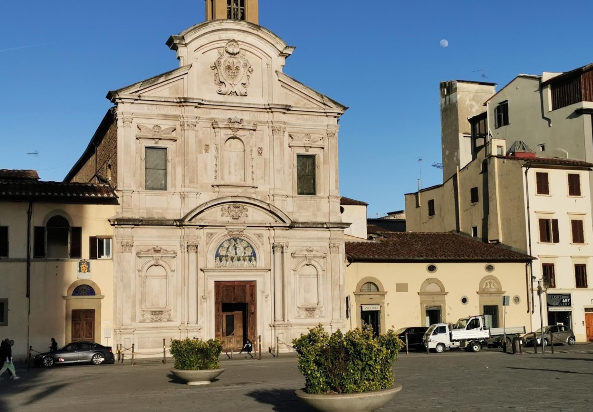
Santi Apostoli
Although this Roman Catholic church in Florence and its works of art were badly damaged in the 1966 floods, the Church of the Holy Apostles is worth seeing for the large terracotta tabernacle by Giovanni Della Robbia in the left aisle and a panel of the Immaculate Conception by Vasari (1541) in the third chapel of the right aisle. The green marble columns have composite capitals, the first two of which are thought to be from the nearby Roman baths. Thanks to Michelangelo, this is one of the best-preserved examples of a Romanesque church in Florence. When churches were being “modernized” in the 15th century, he is said to have urged the architect to retrain his changes and leave the basic structure intact. Along with the Della Robbia tabernacle and the Vasari panel, treasures of the church include the “Pietre del Santo Sepolcro,” brought to Florence in 1101 by a returning crusader. The stones are believed to have been struck to light the lamps in the tomb of Jesus.
Address: Piazza del Limbo, Florence, Italy.
All the above-mentioned Famous Churches in Florence providing the best experience in your life. These best Churches are really amazing for those people who love the worship of God and daily go-to Churches. If you are looking to spend the holidays with your friends and family then here are some Oldest Church and Cathedrals in Florence that you visit once. I hope you like the list of Churches & Cathedrals in Florence which are given above.
The post Best Beautiful Churches & Cathedrals in Florence, Italy appeared first on World Tour & Travel Guide, Get Travel Tips, Information, Discover Travel Destination | Adequate Travel.